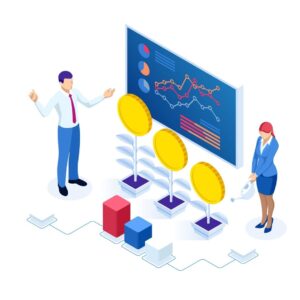Whether trained at work or educated on their own time, new salespeople learn selling tactics in their basic sales training. They are given actionable tips and techniques to use in customer interactions to close a deal. Common tactics include qualifying questions, overcoming objections, body language, transitioning to close and other skills to effectively handle the customer.
Better Basic Sales Training
These classic lessons are still relevant in building rapport and increasing the likelihood of a sale. But today’s customers are savvy, keen to sales techniques and far more aware of their options. Slick salesmanship is less likely to succeed if the product does not align with the modern consumer.
More forward-thinking basic sales training approaches are built on coaching integrity and relationship building. It is less about pushing your product as a salesperson and more about finding the right fit as a consultant.
The philosophical view on sales training helps develop the mindset of today’s professional sellers. Unfortunately, much of these lessons do not outline usable habits in real-world scenarios. Salespeople must figure out how to apply the lessons themselves.
We aim to combine the modern sales vantage point with actionable principles in key areas of the sales strategy. For sales managers developing their basic sales training, these critical touchpoints and perspectives help achieve better results and win more sales.
Center on the Value Proposition
The most consequential components of sales take place before even speaking with a customer. Planning and systems development are the essential factors for consistent sales effectiveness.
Believing in your product as the best solution to fit potential customer’s needs is the starting point for a successful salesperson. It affects every step of the sales process, from prospecting to close. To instill that belief, salespeople need an acute understanding of the value proposition.
A key marketing concept, the value proposition is crucial for salespeople because it is the centerpiece of their customer interactions. The unique value proposition defines what value the product provides to the potential customer not provided by your competition.
Once you understand that beneficial point of differentiation, you will make better decisions in customer interactions. Value propositions help salespeople reveal undiscovered needs, challenge the customer’s status quo and streamline the presentation process.
With more detailed product knowledge and understanding of the unique value proposition, sales reps can better communicate benefits. The value gives a salesperson focus to avoid overselling and ineffective presentations.
Discover the Intended Audience
Finding the right customer increases your chances of closing a sale. Selling to everyone wastes time because everyone’s problems cannot be solved by your product.
And if you sell an imperfect solution, what happens when the customer finds out over time that the value is not there? They regret the decision and are less likely to work with you in the future.
The value proposition leads to the target audience. When you know what value your product has, you will find the right customers.
Asking the right questions into your prospect’s needs reveals if they are a worthwhile prospect. Once you know their exact situation, create a convincing presentation that shows an alignment of the value proposition and their specific needs.
 Appreciate the Value of Projected Sales
Appreciate the Value of Projected Sales
Projected sales are an essential part of developing efficiency in the sales cycle. Accurate forecasting helps salespeople and managers make better decisions in crafting deals and refining processes.
Unfortunately, many forecasting strategies do little to inspire accuracy. Salespeople and sales managers develop bad behaviors that lead to misreporting and withheld deals. Saving face devalues the whole forecasting process.
Effective salespeople stay disciplined with their reporting to lend insight into the forecasting system. In doing so, they provide honest scenarios in more refined detail to better guide future situations.
Projected sales need to be appreciated for their value by sales managers and salespeople. When salespeople are engaged in the forecasting process, better product and pricing options emerge.
Establish a Sales Pipeline
The sales pipeline is the series of steps that move from prospecting to close. It is a tight system of clearly defined steps that guide actions to close deals.
Having a system is significantly beneficial to successful salespeople:
- More accurate and rich data for forecasting.
- Better organization of leads and their place in the pipeline.
- Additional insight to continually improve the sales pipeline.
- Shorter sales cycles and more sales opportunities.
Utilizing CRM software makes building and maintaining a pipeline easy. Tracking and organizing prospects as they move through the pipeline develops consistency and efficiency. This leads to faster closes and greater ease of handling multiple prospects.
A point to remember is that the sales pipeline, like forecasting, updates as circumstances change. Keeping flexibility in the system and remaining open to customer feedback on their experience allows for ongoing optimization.
 Coach a Sales Methodology
Coach a Sales Methodology
The finer points of the sales pipeline make up the sales methodology. Different methodologies are available at each stage as they serve as an overarching guide for the pipeline.
When sales methodologies are built into a sales culture, quota attainment goes up. It is critical that sales methodologies are incorporated into basic sales training to create a consistent, measurable process. Salespeople benefit in several ways when a sales methodology is built into their approach:
- Streamlines the experience for the sales rep and the buyer.
- Reinforces best practices across the sales team.
- Builds confidence through a clear, consistent path.
- Faster results for new salespeople.
- Creates a system to improve methods over time.
Popular sales methodologies have emerged over time, proving their worth across sales contexts. Much of the guesswork has been eliminated and sales managers can experiment with different approaches.
View Salespeople as Consultants
To center efforts around a value proposition to facilitate higher quality sales, viewing sales reps as consultants holds its advantages. Taking a consultative perspective, particularly in B2B sales, entails a better understanding of a client’s business. While a salesperson generally focuses on the product and its intended purpose, the consultant reveals needs that benefit from a solution.
Consultants dedicate themselves to a client relationship. They consider themselves experts in a field, acting as an ongoing resource to help guide clients to the best answer and they operate to inform rather than pitch and persuade. They push their value proposition when there’s a fit and acknowledge their solutions’ weaknesses along with their strengths.
Successful salespeople earn the respect, trust and appreciation of their prospects, whether they close a sale or not. Encouraging positive interactions and integrity in their efforts creates a competitive difference in itself. Prospects are more likely to consider that portion of their experience in future purchases and in word-of-mouth recommendations.
Inbound Sales Best Practices
In today’s markets, building relationships with customers and shirking traditional sales tactics is yielding more positive, sustainable results. For inbound sales teams, teaching these essential skills and outlooks creates a more positive customer experience and higher sales effectiveness:
- Don’t push, pull. Most negative customer experiences reflect pushy sales tactics. Instead, focus on the value proposition and the problems it solves.
- Research before contact. Using lead data, gain an understanding of the prospect’s need, business and purchase history for a more impactful and productive initial contact.
- Back up solutions with proof. Utilize testimonials, case studies or past stories of how solutions helped other customers with similar needs. Seeing real-world benefits helps prospects visualize the implications for achieving their goals.
- Don’t be afraid of losing a sale. This includes knowing when to walk away from a sale. Remembering the value proposition, if there is a poor fit, you generate a longer sales cycle that leads to a poor return if you pursue the business.
Reinforce your basic sales training but remember to regularly engage in evaluation. In evolving markets, getting comfortable in your practices leads to stagnation. Reviewing your sales pipeline, methodologies and sales projection methods allows for continual improvement.
These are just some of the essential basic sales training principles to apply. Plenty more exist as you define your business in better detail. At the Selling Revolution, we understand how impactful nuances are for an organization’s sales health. We partner closely with clients to develop truly custom, optimized sales strategies to ensure sustainable growth. Contact our offices today for more information on how we can improve your sales, management and marketing processes to reach your goals.


 Appreciate the Value of Projected Sales
Appreciate the Value of Projected Sales Coach a Sales Methodology
Coach a Sales Methodology